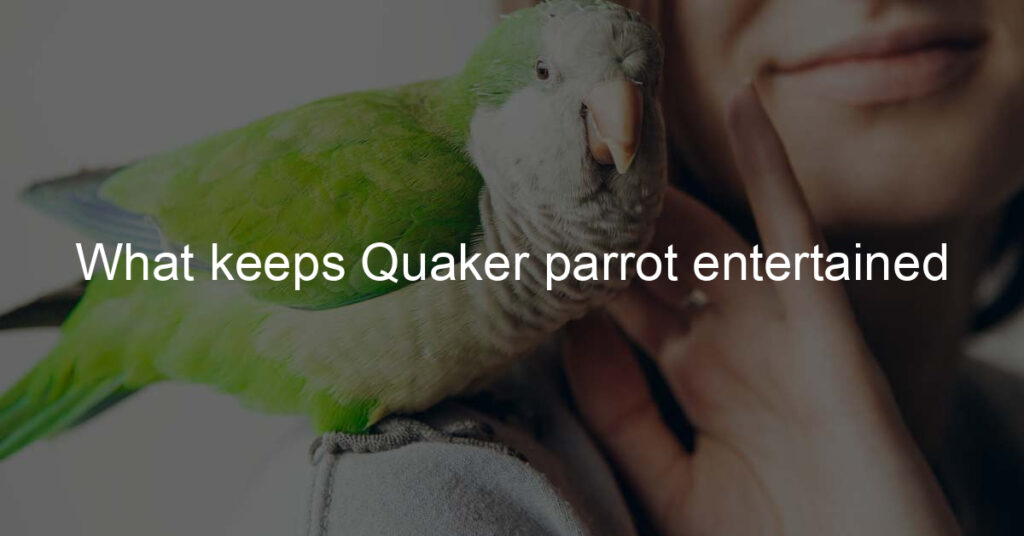You’ve heard your share of stories about parrots talking, singing, and doing tricks; but what keeps a quaker parrot entertained?
Well, they certainly aren’t just another pretty face perched atop the cage. Quaker parrots are known for their alertness and intelligence – in fact, they’re one of the most popular pet birds out there.
They need mental stimulation to keep them healthy and active. With daily interaction as well as appropriate physical items within their enclosures such as toys and perches, you can ensure your feisty feathered friends remain engaged with life.
Read on to learn more about activities that’ll not only help your quaker stay entertained but also mentally stimulated.
- Provide ample toys that encourage problem-solving, such as foraging games, bird puzzles, and swing toys
- Offer your bird a variety of perches of different heights and textures to keep them busy
- Hang a mirror in their cage for them to interact with and play with their reflection
- Introduce new objects or foods into their cage from time to time to keep them stimulated
- Take your bird out of its cage for regular playtime – this will give them exercise and allow them to explore
- Spend quality time interacting with your bird by teaching it tricks or just talking to it
What do parrots do for fun?
Parrots are incredibly intelligent birds, and they love to entertain themselves with exciting activities. Some parrots enjoy playing in their water dishes, splashing around, and having a good time. Others like to find miscellaneous objects around the house to use in their play – feathers, paperclips, and other small items often become toys for these inquisitive birds.
Parrot owners should also be sure to give them plenty of pieces of fruit or nuts as treats; tearing off the peel can make for a fun experience. But perhaps the favorite ‘fun’ activity for parrots is connecting with their human friends, getting pets from them, or just sitting companionably nearby. They are social creatures after all, and enjoy interacting with those around them!
How do I know if my parrot is bored?
One of the biggest giveaways that your parrot is bored with is a lack of activity. If they used to be active and curious, and have suddenly stopped climbing around or exploring their cage or surroundings, then they likely don’t feel like they have much stimulation or excitement.
Other than a decrease in physical activity, you may also start to notice small changes in behavior—like feather plucking, loss of appetite, and vocalizing more often.
Lastly, if you give them a toy and they seem uninterested in it or don’t touch it for days at a time—it’s a good sign that your parrot needs more stimulating activities. The goal is to find a balance between accommodation, exercise, mental stimulation, companionship, and socialization!
What makes a parrot happy?
Parrots need more than just food, water, and shelter to be truly happy. They require a stimulating environment in which to thrive, full of stimulating activities that challenge their physical, intellectual, and emotional skills.
An ideal parrot paradise is one where different perches, too, ys and puzzles are changed often. Toys should provide an outlet for physical agility gain and be available for shredding or ripping up such as chewable blocks or wooden pieces that keep the parrot’s beak sharp.
Additionally, conversation with humans is a must so they can practice their vocal skills and learn new words while feeling heard. With these simple actions taken into consideration, any pet parrot can live a long and happy life.
Wrapping Up
We have seen how keeping a quaker parrot entertained has various benefits to it. Not only does it give your pet bird something to do all day, but it can also benefit both the bird’s physical and mental well-being. At the end of the day, it’s up to you to figure out the best ways to keep your quaker parrot engaged and happy.
You may want to provide an array of activities, such as playing with interactive toys, participating in playtime sessions, giving fresh food options and replacing older ones often, or introducing new forms of enrichment. Furthermore, remember that interacting with your quaker parrot is one of the most rewarding activities you can do for your feathered friend! So get creative and find delicious ways for both of you to enjoy life together in harmony.








